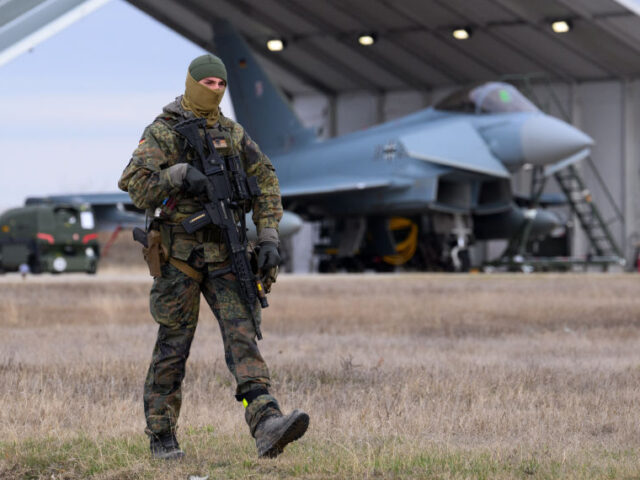The comfortable era of prosperity and the welfare state under the protective umbrella of American defence is ending and Europe needs to “switch to a war economy”, the director of a top European security forum warns.
The United States is drifting away from Europe as a new generation of voters and politicians focus on the Asia Pacific region rather than over the Atlantic, and European states need to start urgent work to prepare for a future era of increased conflict without American firepower to fall back on, Professor Katarzyna Pisarska of the Warsaw Security Forum has told a top German newspaper.
The political scientist painted a bleak picture of the future for Die Welt, noting that fundamental changes in American society — like demographic change, for instance — is going to make holding Washington’s attention in the future more difficult. She told the paper: “For many younger Americans, including a generation of politicians, Europe is little more than an open-air museum. You feel and are actually closer to Asia and the Pacific region. China is the biggest geopolitical threat for them.
“…The USA is changing, demographically. There has been hardly any immigration from Europe for many decades, but from Asia and of course Latin America. This also changes the priorities of politics.”
It will take time for Europe to orientate itself away from the old world of “this lifestyle, the focus on the welfare state, on prosperity under the American protective umbrella”, which Prof. Pisarska believes “is over”. And these changes will take more than a change in rhetoric, she told Welt, noting that while European leaders in nations like France and Germany talk a big game on defence, the actual capability simply isn’t there. She said:
When do preparations for this scenario need to begin? They should have started yesterday… We can, like Emmanuel Macron, speak of “European autonomy”. But what does that mean? Can France station 10,000 soldiers in Poland tomorrow? Can Germany effectively defend NATO’s eastern flank? Credible deterrence is needed. We currently only have that with the Americans.
While American attention and money flowed for Ukraine, the U.S. soon moved on when a new war erupted with the Hamas terror attacks on Israel, and when such a time that war with China comes in the Pacific, it will become even more difficult for Europe to make the case for American defence. One way for that would be Europe showing it is willing to help America with its own priorities around the world, Pisarska suggested, but Germany’s own dependence on China is so great, for instance, that it seems unlikely.
In all, the academic said, Europe is “entering an era of wars”, and the lack of political will in Europe to adequately prepare for that and “switch to a war economy” will “cost us dearly.”
The Warsaw Security Forum which Prof. Pisarska leads has become something of a venue for such clarion calls, as previously reported. In October the British government used the Forum to sound the alarm on the dire state of ammunition production in Europe, which is being totally consumed by the Ukraine war and leaving national stockpiles looking “a little thin”.
UK Armed Forces Minister James Heappey said the West had pivoted away from having a large arms-producing industrial base with considerable reserves during the Cold War to a slimmer holding in the modern world, and while this suited the predictable cycle of military deployments and consumption of munitions, it has been totally unequal to meeting the demands of the Ukraine war. He said this system “does not work when you need to be ready for a fight tomorrow and crucially your capacity to fight that fight tomorrow is part of the deterrence.”
“We don’t actually have a lot of [industry] anymore”, Heappey observed, saying: “that leads to some really interesting questions about where is near to the UK with defendable sea and air lines of communication where we can have an offshore manufacturing base which is more resilient and more reachable for the UK than where we manufacture now.”
Admiral Rob Bauer, the chairman of NATO’s Military Committee also spoke at the forum and made similar remarks, telling his military peers that: “we need the industry to ramp up the production at a much higher tempo. We need large volumes.
“The just-in-time, just-enough economy that we built together in our liberal economies for 30 years is fine for a lot of things, but not for the armed forces when there is a war ongoing.”
Poland — understandably perhaps, given it is on NATO’s eastern flank and among the most exposed nations, should such warnings come true — is the most hawkish of the alliance’s members when it comes to Russian expansionism. As reported earlier this month the chief of Poland’s security bureau Jacek Siewiera warned NATO assumptions about the amount of time it has to rebuild to be able to rebuff claimed future aggression by Russia into Europe are seriously optimistic.
Rather than German estimates of Europe having ten years to prepare, the Polish security expert said NATO actually has three years, by which point it has to be strong enough in Europe to show it is able to repel an attack, consequently deterring one from happening at all.
Germany, for instance, would almost certainly fail to make such a deadline. German academic Sönke Neitzel has previously said Germany’s army is at least 15 years away from being combat-ready. If Russia attempted to attack NATO now, the lives of alliance soldiers would be forfeit as Europe has no hope of winning the “first battle”. Neitzel compared it to battles in European history where unprepared states were “washed away”.

COMMENTS
Please let us know if you're having issues with commenting.